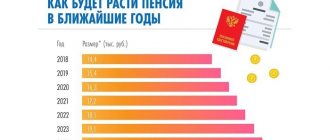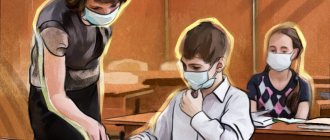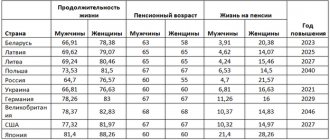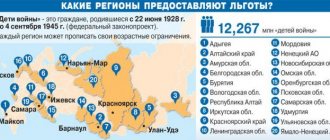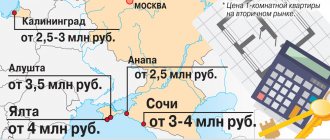People with disabilities are among the most socially vulnerable categories of citizens in the country. Since their health condition does not allow them to work at full capacity, and the majority are completely deprived of the ability to work. For this reason, they need financial support from the state. They receive social payments and disability benefits both at the federal level and separately by region. In 2020, disability benefits in the Russian Federation do not replace a pension; it is possible to receive additional support in the form of payments.
Note! If you have any questions, you can chat for free with our lawyer at the bottom of the screen or call the HOTLINE. Free call for all of Russia.
Types of disability benefits
Citizens who have lost the ability to work due to disability are assigned the following types of financial support:
- Social pension for those who have not accumulated insurance coverage. Persons under the age of eighteen, pensioners, as well as those citizens who have lost their breadwinner have the right to receive it.
- A labor pension is assigned as compensation for the lost opportunity to earn income through labor. To receive this type of payment, you must have a minimum length of service, which is equal to one day.
- The state pension is awarded based on length of service to the following categories: cosmonauts, military personnel, victims of man-made accidents, participants in the Great Patriotic War and citizens who survived the blockade.
Categories of citizens eligible to apply for disability benefits in 2020
All citizens with disabilities can count on receiving payments, provided that their status is officially confirmed. The medical organization issues a conclusion about a persistent decline in health, but you will still have to regularly undergo a commission so that the doctor has the opportunity to make sure that there is no improvement.
In the Russian Federation, there are several groups of disability based on health conditions:
| Disability group | Characteristics and Features |
| First | Completely dependent on third parties and deprived of the ability to navigate in space, control oneself, and move. |
| Second | Can work with the help of auxiliary tools, is oriented in space, and is able to move. |
| Third | There is a serious illness that does not prevent work with loyal requirements. |
| Disabled children | There is no provision for division into groups for citizens under the age of majority. |
These categories of people have the right to receive benefits in the established amount. They also receive additional benefits, as well as monthly and one-time disability benefits.
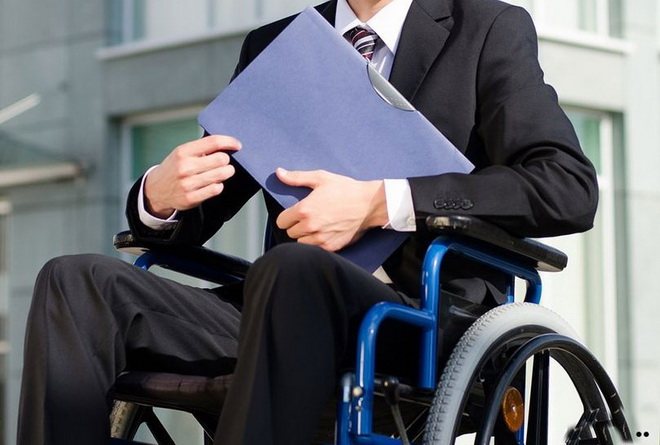
One-time benefit
Material government support, expressed in cash or in kind. A citizen can exercise his right to choose the form of such benefits.
In natural form, it is sold in the following forms:
- city telephone service;
- annual travel to the sanatorium;
- social services;
- Dental prosthetics once every five years.
In material equivalent, a one-time benefit is paid in an amount that depends on the group:
- first - three thousand eight hundred ninety-seven rubles;
- second - two thousand seven hundred eighty-three rubles;
- third - two thousand two hundred twenty-eight rubles;
- disabled children - two thousand seven hundred eighty-three rubles.
A citizen can refuse assistance in kind in full or from one type of service and replace it with a cash equivalent.
Insurance payment
It is awarded if two important conditions are met:
- Any disability group is registered.
- Confirmed work experience.
The disability insurance pension depends on several components:
- groups;
- length of service;
- paid insurance premiums;
- presence in the family of persons who are in care;
- region of residence of the citizen.
Expert opinion
Konstantin Viktorovich
Area of scientific interests: civil law, family law, consumer protection, criminal law, inheritance law
The amount of the insurance pension consists of a fixed part, determined by the Government of the Russian Federation and indexed annually. As of January 1, 2020, its size ranges from three thousand four hundred sixty rubles to twenty four thousand three rubles. The amount of disability benefits is usually calculated taking into account the disability group, family and social status, as well as the length of work of a particular citizen.
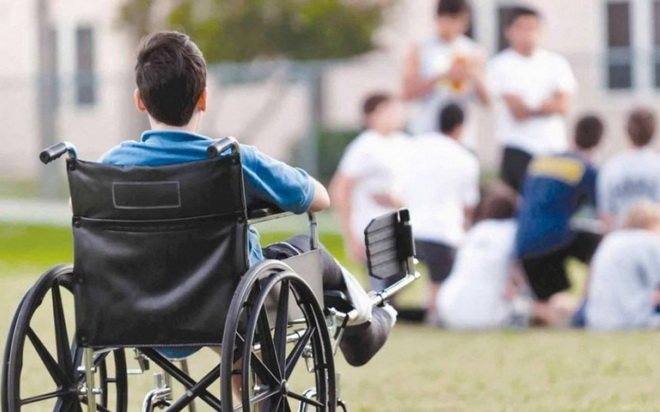
Will the EDV be indexed for people with disabilities?
Every year the state raises benefits for vulnerable segments of the population through indexation, including EDV for disabled people of 2 and other groups. In 2020, the increase was made on February 1 by a factor of 1.043. Taking into account inflation over the past period, this value is not enough to equalize the financial situation of citizens. But another wave of indexation is not planned for this year. According to the plan, the procedure will be carried out only in the next calendar period; the coefficients and amount of the increase are still unknown.
Thus, the amount of monthly cash payments to disabled people of 2 and other groups in 2020 was indexed and increased according to the current coefficient. Each benefit recipient has a choice whether to accept social assistance from the state in the form of free medications, vouchers to sanatoriums, etc. or not. If you refuse, the amount of regular allowance will be increased by an amount equal to the monetary equivalent of the NSO.
Disability benefit for the first group in 2020
The amount of the fixed payment to the disability insurance pension of the first group is equal to five thousand six hundred eighty-six rubles twenty-five kopecks monthly.
| Recipient category | The amount of a fixed payment to the disability insurance pension, taking into account increases to it |
| Disabled people of the first group | Without dependents - eleven thousand three hundred seventy-two rubles fifty kopecks monthly With one dependent - thirteen thousand two hundred sixty-seven rubles ninety-two kopecks monthly With two dependents - fifteen thousand one hundred sixty-three rubles thirty-four kopecks monthly With three dependents - seventeen thousand fifty-eight rubles seventy-six rubles seventy-six kopecks monthly |
| Citizens who live in the Far North and equivalent territories | The fixed payment to the disability insurance pension and increases to it are increased by the corresponding regional coefficient |
| Disabled people of the first group who have worked for at least fifteen calendar years in the Far North and have an insurance record of at least twenty-five years for men or at least twenty years for disabled women | Without dependents - seventeen thousand fifty-eight rubles seventy-eight kopecks monthly With one dependent - nineteen thousand nine hundred one ruble eighty nine kopecks monthly With two dependents - twenty-two thousand seven hundred forty-five rubles two kopecks monthly With three dependents - twenty-five thousand five hundred eighty-eight rubles fifteen kopecks monthly (regardless of place of residence) |
| Disabled people of the first group who have worked for at least twenty years in areas that are equated to the regions of the Far North, with insurance experience of at least twenty-five years for men or at least twenty years for women | Without dependents - fourteen thousand seven hundred eighty-four rubles twenty-six kopecks monthly With one dependent - seventeen thousand two hundred forty-eight rubles thirty-one kopecks monthly With two dependents - nineteen thousand seven hundred twelve rubles thirty-five kopecks monthly With three dependents - twenty-two thousand one hundred seventy-six rubles and forty kopecks monthly (regardless of place of residence) |
The fixed part, taking into account regional coefficients, is accrued regardless of the place of registration of the citizen on the day the payment is made. Therefore, in order to receive an increased insurance payment for work in the Northern regions and equivalent territories, it is not at all necessary to live there.
One-time cash payments amount to three thousand eight hundred ninety-seven rubles. It is accrued if the recipient received a one-time benefit in cash rather than in kind.
Benefits that disabled people of the first group can enjoy:
- To pay utility bills (fifty percent).
- Housing subsidy.
- For education.
- Free travel on city public transport, and a fifty percent discount on travel on other types of transport.
- A trip to a sanatorium, medications and medicines, prosthetics.
- Social services: nurse, discounts on funeral services and others.
- Citizens who have lost their ability to work as a result of hostilities, as well as prisoners of concentration camps, have the right to receive additional monthly financial support, which is equal to one thousand rubles.
- additional monthly financial support for disabled people of the Great Patriotic War and residents of besieged Leningrad is five hundred rubles.
With an income below the subsistence level, a disabled person of one group can receive federal social subsidies. Its amount varies depending on the region.
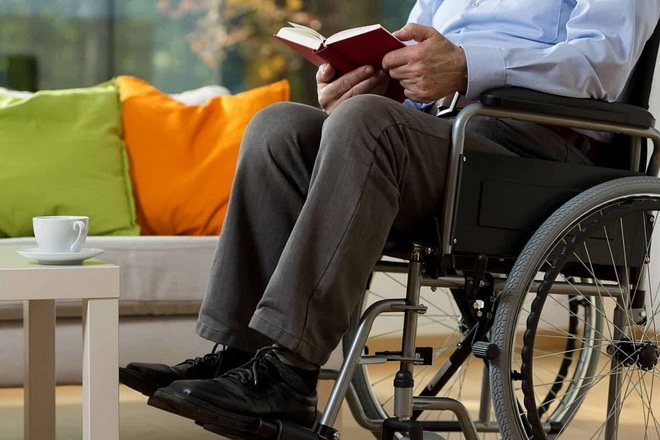
Disability benefit for the second group in 2020
The amount of the fixed payment to the disability insurance pension of group II is five thousand six hundred eighty-six rubles twenty-five kopecks monthly.
| Category of pension recipients | The amount of a fixed payment to the disability insurance pension, taking into account increases to it |
| Disabled people of the second group | Without dependents - five thousand six hundred eighty-six rubles twenty-five kopecks monthly With one dependent - seven thousand five hundred eighty-one rubles sixty-seven kopecks monthly With two dependents - nine thousand four hundred seventy-seven rubles nine kopecks monthly With three dependents - eleven three hundred seventy-two rubles fifty-one kopecks monthly |
| Citizens who live in the Far North and equivalent territories | The fixed payment to the disability insurance pension and increases to it are increased by the corresponding regional coefficient |
| Disabled people of the second group who have worked for at least fifteen calendar years in the Far North and have an insurance record of at least twenty-five years for men or at least twenty years for women with disabilities | Without dependents - eight thousand five hundred twenty-nine rubles thirty-eight kopecks monthly With one dependent – eleven thousand three hundred seventy-two rubles fifty-one kopecks monthly With two dependents - fourteen thousand two hundred fifteen rubles sixty-four kopecks monthly With three dependents - seventeen thousand fifty-eight rubles seventy-seven kopecks monthly (regardless of place of residence) |
| Disabled people of the first group who have worked for at least twenty years in areas that are equated to the regions of the Far North, with insurance experience of at least twenty-five years for men or at least twenty years for women | Without dependents - seven thousand three hundred ninety-two rubles thirteen kopecks monthly With one dependent - nine thousand eight hundred fifty-six rubles eighteen kopecks monthly With two dependents - twelve thousand three hundred twenty rubles twenty-two kopecks monthly With three dependents - fourteen thousand seven hundred eighty-four rubles twenty-seven kopecks monthly (regardless of place of residence) |
The amount of the one-time benefit is two thousand seven hundred and eighty-three rubles.
The DEMO amount is the same as for disabled people of the first group - one thousand and five hundred rubles, depending on the status of the recipient. Federal subsidies are paid if a citizen’s income is less than the subsistence level.
Privileges:
- Free travel on public transport.
- Fifty percent discount on travel on other types of transport.
- Visit the sanatorium annually.
- Benefits for medicines.
- Free prosthetics.
- For education.
- Free medical devices and drugs that provide a decent standard of living: hearing aids, orthopedic shoes, etc.
- Fifty percent discount on housing and communal services.
Also, disabled people of the second group have the right to improve their living conditions. They have the right to take advantage of a housing subsidy to purchase real estate.
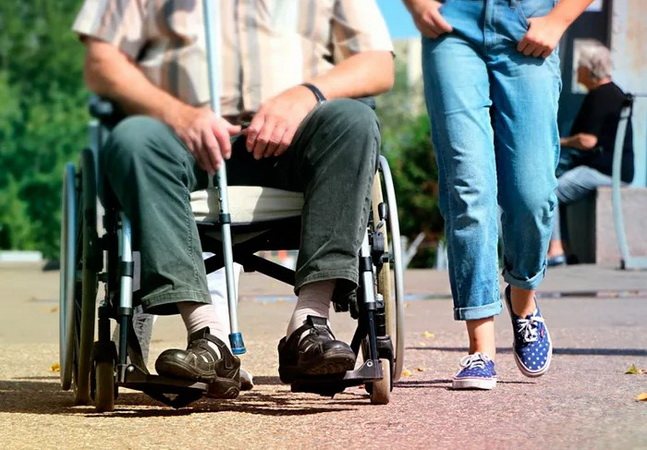
Basic Concepts
| Monthly cash payment (MAP) | Funds paid to a certain category of citizens as a partial or complete replacement of benefits |
| Disabled person | A person who is unable to fully provide for his own needs due to illness, injury, etc. |
| Disability group | A criterion that indicates the degree of limitation of a citizen’s actual capabilities, and the severity of the condition implies the establishment of group 3, 2 or 1 |
| NSO (set of social services) | A social package that includes a number of services, namely, free medicines, travel on public transport and a trip to a sanatorium with the right to get to the place of treatment free of charge |
Disability benefit for the third group
The fixed payment to the disability insurance pension of the third group is two thousand eight hundred and forty-three rubles and thirteen kopecks.
| Category of pension recipients | The amount of a fixed payment to the disability insurance pension, taking into account increases to it |
| Disabled people of 3 groups | Without dependents - two thousand eight hundred forty-three rubles thirteen kopecks monthly With one dependent - four thousand seven hundred thirty-eight rubles fifty-five kopecks monthly With two dependents - six thousand six hundred thirty-three rubles ninety-seven kopecks monthly With three dependents - eight thousand five hundred twenty-nine rubles thirty-nine kopecks monthly |
| Citizens living in the Far North and equivalent territories | The fixed payment to the disability insurance pension and increases to it are increased by the corresponding regional coefficient |
| Group 3 disabled people who have worked for at least fifteen calendar years in the Far North and have an insurance record of at least twenty-five years for men or at least twenty years for women with disabilities | Without dependents - four thousand two hundred sixty-four rubles seventy kopecks monthly With one dependent - seven thousand one hundred seven rubles eighty-three kopecks monthly With two dependents - nine thousand nine hundred fifty rubles ninety-six kopecks monthly With three dependents - twelve thousand seven hundred ninety-four rubles nine kopecks monthly (regardless of place of residence) |
| Disabled people of the third group who have worked for at least twenty years in areas that are equivalent to the regions of the Far North, and have an insurance record of at least twenty-five years for men or at least twenty years for women | Without dependents - three thousand six hundred ninety-six rubles seven kopecks monthly With one dependent - six thousand one hundred sixty rubles twelve kopecks monthly With two dependents - eight thousand six hundred twenty-four rubles sixteen kopecks monthly With three dependents - eleven thousand eighty-eight rubles twenty-one kopecks monthly (regardless of place of residence) |
Also, citizens with this disability group are entitled to:
- EDV – two thousand two hundred twenty-eight rubles.
- DEMO - from five hundred to one thousand rubles.
- Federal subsidy (if a disabled person receives a minimum income below the subsistence level).
Privileges:
- Discount on payment for housing and communal services in the amount of fifty percent.
- Right to housing subsidy.
- Free travel on public transport.
- Visit to the sanatorium with a fifty percent discount.
- Fifty percent discount on medications (on certain medications).
- Benefits for training.
For working disabled people, increased leave of up to sixty days and a reduced working week of forty hours are provided. Dismissal of a disabled worker at the initiative of the employer is legal if the employee has been undergoing treatment or recovery for more than four months. At the same time, the employee retains the right to paid sick leave and severance pay.
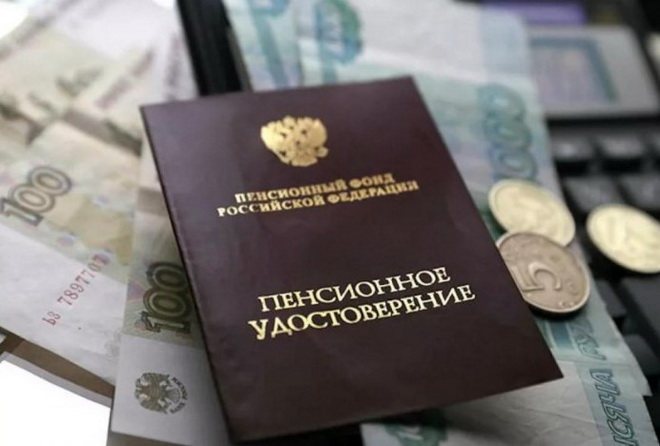
Are deductions applied to the daily allowance for disabled people of category 3?
Due to the fact that when monetizing benefits that were previously presented in kind, a person receives income, it is allowed to apply deductions to the EDV. For example, when a person is responsible for paying alimony or other payments, up to 3/4 may be withheld from the benefit.
Exceptional situations occur when the disabled person is in a specialized institution.
Then it is fully provided by the state. Deductions are not allowed .
The value of the monthly allowance for disabled people of group 3
Today, the monthly payment for a category 3 disabled person is 2,126 rubles . This amount is indicated excluding VAT. If a person refuses social services, the amount of the supplement becomes larger.

This type of payment is subject to indexation. Every year the premium gets higher. The increase in pensions and daily allowance in 2020 for disabled people of group 3 is planned for February.
Thus, a citizen who has passed the ITU and is declared disabled . To receive money, you will need to write an application and send it to the Pension Fund. The benefit is accrued from the year following the application.
Amount of benefits for disabled people since childhood
Social pension: first group - twelve thousand six hundred eighty-one rubles nine kopecks, second group - ten thousand five hundred sixty-seven rubles seventy-three kopecks, third group - four thousand four hundred ninety-one rubles thirty kopecks.
EDV: first group - three thousand eight hundred ninety-seven rubles, second - two thousand seven hundred eighty-three rubles, third - two thousand two hundred twenty-eight rubles.
There is also a disability benefit in case of loss of a breadwinner. Its amount depends on the breadwinner's insurance pension.
Persons disabled since childhood have the right to the same benefits as persons who have become disabled during their lifetime.
Payments to disabled people who have not reached the age of majority:
- Social benefits – twelve thousand four hundred thirty-two rubles forty-four kopecks.
- EDV – two thousand seven hundred eighty-three rubles.
- The following payments are provided for caring for a disabled child:
- ten thousand rubles for parents and guardians;
- one thousand two hundred rubles - for other persons.
Expert opinion
Konstantin Viktorovich
Area of scientific interests: civil law, family law, consumer protection, criminal law, inheritance law
Also, disabled children have the same benefits as other disabled citizens. Additional benefits in the form of increased leave, early retirement and additional days off are available to their parents or guardians.
These benefits are assigned only to children under the age of majority. If the ability to work has not been restored after 18 years, then the person receives the status of “childhood disabled” with a certain category and is assigned social disability benefits.
Who is considered disabled group 2 in 2020?
A disabled person of the second group in 2020 can be considered a person who has all severe or moderately severe health impairments, but at the same time such a citizen is able to care for himself and does not require the constant presence of a nurse or third parties caring for him. Disability can be assigned indefinitely if the disease cannot be treated. In all other cases, a person must undergo an ITU commission after a certain period of time.
Attention, if you have any questions, you can ask them to a lawyer on social issues by calling 8 800 350 83 46 or ask your question in a chat to the lawyer on duty. Calls are accepted 24 hours a day. The call is free! Call and solve your problem!
The Ministry of Health and Social Development of the Russian Federation has determined the criteria defining a disabled person of the second group:
- partial restriction of self-service;
- need for help from other people;
- partial restriction of movement;
- partial loss of the ability to communicate with other people;
- loss of objective perception of the environment;
- possible loss of self-control;
- the need for special training programs;
- the need to create special conditions for working.
People with this disability group in Russia have the right to work .
The Russian Ministry of Health and Social Development has determined a list of diseases that allow a person to receive a second disability group. Persons suffering from:
- chronic pulmonary failure;
- tuberculosis;
- liver cirrhosis;
- heart disease;
- damage to the spinal cord, resulting in irreversible changes in the functioning of the musculoskeletal system;
- paralysis;
- irreversible loss of vision in both eyes resulting from treatment;
- skull defects;
- loss of lower limbs, which does not allow installation of a prosthesis;
- destruction of the hip joint;
- the presence of a urinary fistula;
- anal anomalies that cannot be treated;
- arthrosis of the hip joint 1 or 2 degrees;
- the presence of a short limb that interferes with active movement;
- combination of amputation of any limb with loss of hearing or vision;
- organ transplantation with positive dynamics over 5 years;
- removal of two joints with subsequent replacement with prostheses;
- mental disorders lasting at least 10 years;
- epilepsy;
- dementia;
- neoplasms that cannot be removed through surgery;
- infectious diseases that cause complications in the central nervous system;
- brain lesions resulting in restrictions on motor activity.
Medical examination
The VTEK examination should be carried out at the place of registration of the person who needs to receive a disability. If a citizen cannot move independently, the procedure will be carried out at his home. A positive medical and social examination report will allow you to officially receive a monthly benefit from the state.
To be assigned a disability, it is necessary to provide documents regarding the state of health, living conditions, and undergo a medical examination within the framework of an expert commission. The commission consists of qualified physicians who are able to give an opinion on the condition of the person who submitted the application (you can view and download it here: [Sample application for passing the ITU]).
The result of the commission's work is the execution of an act expressing the general decision of the commission. The second disability group is given for a period of up to a year . After this, you need to undergo a second medical examination. The amount of the benefit does not depend on the period of disability.
Pensions for disabled people of group 2
Social pensions and pensions for disabled children are provided for by the current law on state pensions. Parents or guardians of disabled children receive a pension and monthly allowance, which is due to an able-bodied citizen caring for a disabled child.
The size of the social pension and pension for people with disabilities since childhood is established by the state pension fund in accordance with current Russian legislation and government orders on indexation. Therefore, able-bodied disabled people of the second group are not afraid of unemployment, since they can constantly receive financial support from the state. Before reaching the age of majority, a pension for a disabled child is received by one of his parents or guardian . After reaching adulthood, social benefits are issued to the disabled person from childhood. Disabled children from childhood may have the first and second. Guardians of disabled children have the right to receive social benefits, including earlier retirement at 50 years of age and the inclusion of child care time in their work experience.
An insurance pension is accrued to people who become disabled as a result of losing their ability to work and who have worked for at least 1 day. Calculation occurs individually.
Increasing pensions for disabled people of group 2 in 2020
For disabled people of the second group in 2020, the size of the social pension was increased on April 1 by 2.9%. The amount of security is 5160.01 rubles per month . If a person is registered as a childhood disabled person in the second group, then he receives a pension of 10,481.34 rubles per month.
The legislator determined the basic size of the fixed part of the insurance pension for disabled people of group 2 with work experience. If a person has no dependents in the family, then the size of the labor pension will be 5334.19 rubles. per month. The size of the IPC from January 1, 2020 is 87.24 rubles . The combination of these two values will be the required pension amount. The specified data is relevant for 2020 after indexation, which took place on January 1 by 7.05% .
If there is one dependent in the family, the size of the basic labor pension will increase:
- for 1661 rubles with 1 dependent;
- for 3322 rubles with two;
- for 4983 rubles with three.
Benefits for disabled people of group 2 in 2020
Monthly cash payments to disabled people of the second group in 2020 after indexation on February 1 will amount to 2,678.31 rubles. rubles with a complete refusal of social services (their amount was 1121.42 rubles ). Every year the EDV increases in accordance with price changes over the past year .
Citizens can also receive regular or one-time compensation for utility bills and upon dismissal from work.
NSO for disabled people in 2020
, and for other categories of beneficiaries, will increase by 46.23 rubles and
amount to
1121.42 rubles against 1075.19 rubles in 2020. Included:
- provision of medicines or necessary products in the amount of 863.75 rubles;
- payment for sanatorium treatment in the amount of 133.62 rubles;
- payment for travel to the place of treatment and back in the amount of 124.05 rubles.
The recipient of the NSO has the right to fully or partially refuse the services provided. The amount of EDV receivable will be revised monthly by the cost
these services. It goes like this:
- if the beneficiary needs the entire range of services provided by the state, then the amount of the EDV will be reduced by the entire amount of the NSO in 2020
- by 1121.42 rubles; - if he refused only part of the services, then 863, 75 rubles, 133, 62 rubles or 124.05 rubles will be deducted from the EDV amount, respectively;
- if the beneficiary refuses all services, then he will receive the EDV in full
.
Table of increase in the amount of daily allowance for disabled people of group 2 from February 1, 2020
| NSU received by a pensioner | EDV for a disabled person of group 2 |
| Medicines | 1837.87 rub. |
| Medicines, a trip to a sanatorium | RUB 1,704.25 |
| Medicines, free travel on railway transport | RUB 1,713.82 |
| Voucher to the sanatorium | 2568.00 rub. |
| Voucher to the sanatorium, free travel on railway transport | 2443.95 rub. |
| Free travel on railway transport | RUB 2,577.57 |
| Full set of medical aids (medicines, voucher to a sanatorium, travel by railway transport) | 1580.20 rub. |
| Refusal to obtain NSO | 2701.62 rub. |
Severance pay for disabled people
If a person is recognized by a medical commission as unfit to perform a certain work activity that he was previously engaged in, then upon dismissal he receives severance pay for disability. Severance pay to a disabled person can be paid only in cases where there is no suitable place for him or his incapacity prevents the employee from performing any more job duties.
If an employee who has been recognized as disabled refuses the job offer, he will not be paid severance pay.
The amount of severance pay for disability is equal to the amount of wages for two working weeks in this position.
Additional payments for housing and communal services
For disabled people of the second group, it is necessary to make additional payments for utilities and housing in an amount of no less than 50% of the current tariff ; a citizen also has the right to receive an additional payment for fuel if he lives in a room without central heating.
Compensation payments are processed through the local pension fund. To do this you must provide:
- passport;
- documentary confirmation of the rights of a disabled person to receive preferential additional payments;
- a certificate from the housing department about the number of persons registered in the apartment;
- current receipts for housing payments.
Procedure for obtaining benefits
The stages of applying for disability benefits include:
- Passing a medical and social examination to obtain disability.
- Appeal to the pension fund with a request to register all benefits due to a disabled person. To do this, you must submit a passport, ITU conclusion, and work book.
List of required documents
To apply for disability benefits and payments you will need to provide:
- passport;
- ITU conclusion;
- work book;
- certificate of presence of dependents.
Conclusion
A person who is a disabled person of the second group has the right to receive social protection from the state. Such a monetary allowance allows him to realize himself in this life. Citizens are entitled to:
- monthly payment of social pension;
- surcharges for housing and communal services;
- severance pay in case of loss of previous job;
- accrual of a regular labor pension on the basis of pension legislation;
- opportunity to work in a suitable position.
- preferential medical examination and treatment;
- benefits for obtaining higher education.
The most popular questions and answers regarding benefits for disabled people of group 2
Question: How is a citizen officially recognized as disabled? How can I pass the ITU?
Answer: Decree of the Government of the Russian Federation on the procedure for recognizing citizens as disabled No. 95 dated February 20, 2006 . (as amended by Resolutions of the Government of the Russian Federation dated 04/07/2008 N 247, dated 12/30/2009 N 1121) determines the procedure for conducting the expert commission, its composition and the forms for developing a joint expert decision. To make a decision on determining disability, experts study the state of a person’s health, the level of limitation of his life activity, based on his living conditions, information about his professional, labor, psychological and emotional characteristics, which are accepted by modern medical practice and officially approved by the Ministry of Health and Social Development of the Russian Federation.
List of laws
- Decree of the Government of the Russian Federation on the procedure for recognizing citizens as disabled No. 95 of February 20, 2006
Samples of applications and forms
You will need the following sample documents:
- Sample application for passing the ITU
How to apply for benefits - required documents
You can find the procedure for applying for benefits at the medical institution where the disability group is assigned. As soon as you have received the appropriate conclusion, you should contact the Pension Fund of your region. Here you need to provide:
- Identification;
- Conclusion of the commission;
- Work book.
When applying for other benefits, for example, a subsidy for utilities, an additional set of papers may be required, for example, a certificate of family composition.
Disability benefits are usually assigned together with a pension; just contact the Pension Fund, where they will calculate the specific amount of the benefit, tell you what papers you need to provide, and how payments are received. You will also need to open a bank account or take your card details where the money will be transferred. In addition to payments, there are also additional benefits and various services for the disabled - you shouldn’t refuse a little help.
NSU of a disabled person of group 3
It is worth taking into account that the exact amount of the monthly allowance for a particular beneficiary will be determined after he chooses which services to keep and which to refuse.
At the same time, NSU in monetary terms reaches 1155 rubles. 5 kopecks, that is, includes:
— the cost of medicines is 889.66 rubles;
— compensation for sanatorium vouchers — 137.63 rubles;
— travel in suburban and intercity transport — 127.77 rubles.
By law, these services can be replaced with money in full or in part.
Procedure for payment of benefits
Social pension is paid monthly. The pensioner can choose the authority that will pay the pension and the method of receiving it. In addition to the pensioner, the person for whom the power of attorney is issued has the right to receive a pension. The validity period of the power of attorney is one year.
Now let's look at three ways to get paid:
- Through Russian Post. There are two options - receive your pension at the branch or at home. In this case, the money must be paid within the delivery period (its period differs in each branch). If the pension is not withdrawn within six months, its payment stops. To resume payment, the pensioner needs to contact the Pension Fund;
- Through the bank. Money is given out at the cash desk or transferred to a card, which can be withdrawn without commissions at the bank’s own ATM. Thus, the pension is available on the day it is transferred. Banks do not charge interest for servicing pensioner accounts;
- Through an organization engaged in the delivery of pensions. You can pick up the money at the office of such an organization or receive it in your hands while at home. A complete list of organizations is approved at the regional level. Their list is published by the territorial branch of the Pension Fund.
To approve or change the payment procedure, you can contact the Pension Fund in two ways - by physically visiting the territorial representative office or by sending an electronic appeal (via the “Personal Account of a Citizen on es.pfrf.ru”).
Additional assistance for people with disabilities
In addition to payments and monetary compensation, the state offers disabled people benefits in the following areas and areas of life:
- Working conditions. Without the consent of disabled people, they cannot be forced to work overtime, on weekends or at night. The nature of the work itself should not be harmful to health;
- Public transport. Travel is free for disabled children, as well as disabled people of groups I and II who have visual impairments or cannot move;
- Driving. Disabled people of all groups can install a “Disabled” sign on their car - this allows them to park for free;
- Discount on medicines. This benefit is provided in the amount of 50 or 100% depending on the group and whether the disabled person is employed;
- Public places. Disabled people of groups I and II are accepted without waiting in line wherever people are treated or served (in clinics, in stores, etc.);
- Accommodations. The standard area for a disabled person is 36 m², twice as much as for a healthy person. An apartment or land plot is equipped with special equipment and devices (for example, ramps) at the expense of the state;
- Social housing. A disabled person may qualify for housing under a social tenancy agreement. At a minimum, he will be registered, and a disabled orphan will be given housing out of turn.
The list presented is far from complete. All benefits can be found in the text of the Federal Law on the social protection of disabled people in the Russian Federation.
Previous
Administrative responsibilityBan on barbecue 2020: where you can’t light a fire and how they can be punished
Next
Civil lawWhat types of payments will Russians be able to receive from August 1, 2020
Note! If you have any questions, you can chat for free with our lawyer at the bottom of the screen or call the HOTLINE. Free call for all of Russia.

